How Reigns and its sequel make their 'Tinderocracy' work
Is that even a word?
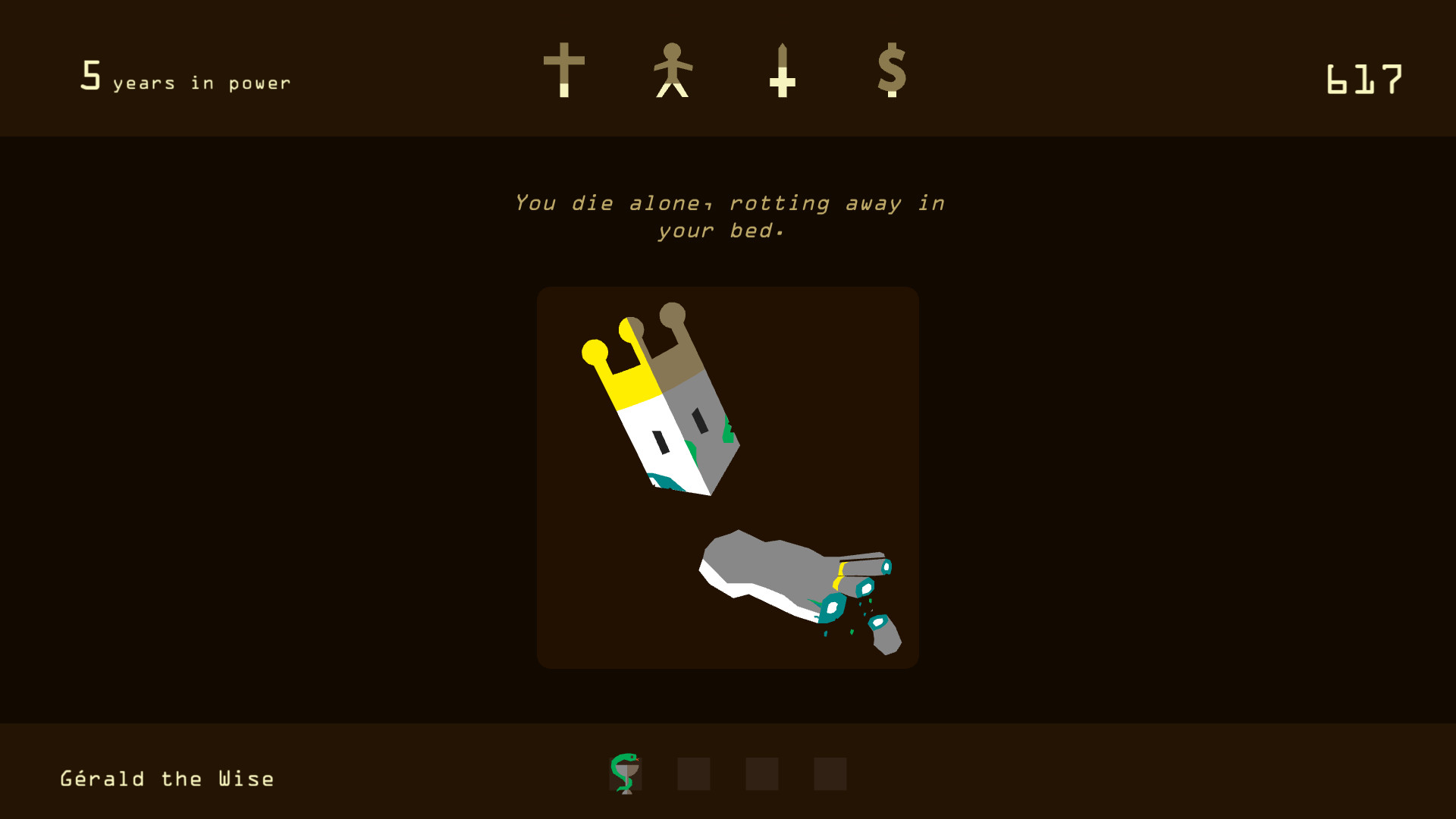
I have drowned. I have been tortured and fed to dogs, turned into a martyr by the church, and also deposed by the church so they can create a heaven on earth. My head has been placed on a spear (or possibly a pike, which I believe is what you call a spear once a head is on it). I have been poisoned by my brother-in-law James, hanged, stabbed by a skeleton, and eaten by rats.
It is not always good to be king.
Reigns was released on mobile and PC in 2016, and became a surprise hit. When developer François Alliot received his first royalty payment it was followed by a phonecall from the UK tax office asking why he was receiving suspiciously large sums of money.
He'd hit on a simple, absurdist idea, perfectly of its time: combine the swiping of Tinder with the decision-making of medieval rulership. The very modern act of idly thumbing away pictures of Hotties In Your Area combined with the weighty problems of a king whose choices could result in war or famine. It's inherently funny.
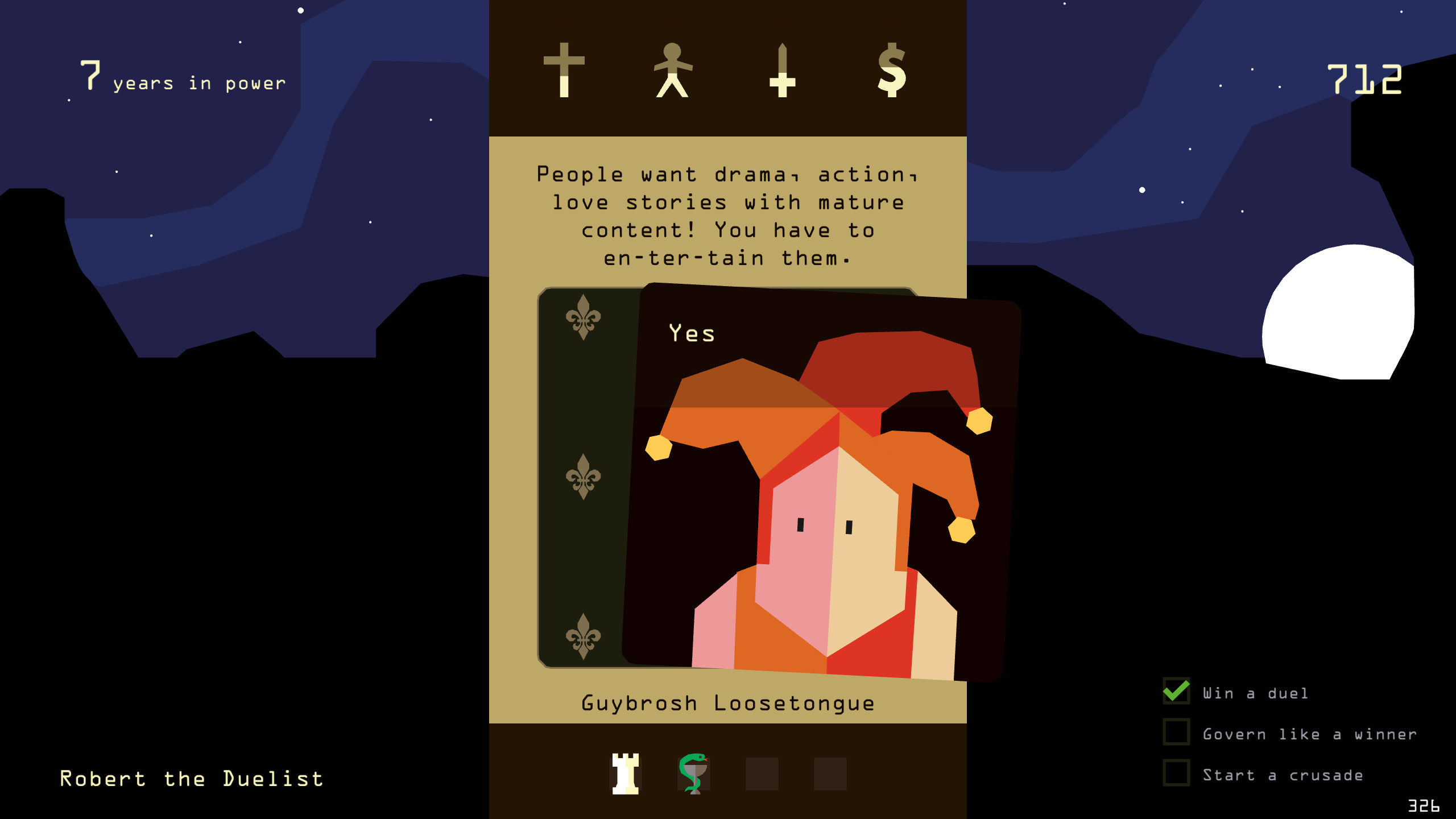
Reigns has more to it than that, though. It's a game about finding balance, making sure the distribution of power between the church, the military, the people, and the treasury (represented by four symbols at the top of the screen) never swings too far in one direction. Because once it does, it's finger-across-the-neck time.
Digging deeper, there's a hidden layer in which visits from the Devil and visions of the future reveal this endless procession of doomed kings is more than it seems, and that Reigns is more than a game.
Nerial Games and Devolver Digital are following up with a sequel called Reigns: Her Majesty, in which you play as the Queen. We spoke to Alliot about that, and about how he got from that initial, straightforward idea for Reigns to where he is today.
Keep up to date with the most important stories and the best deals, as picked by the PC Gamer team.
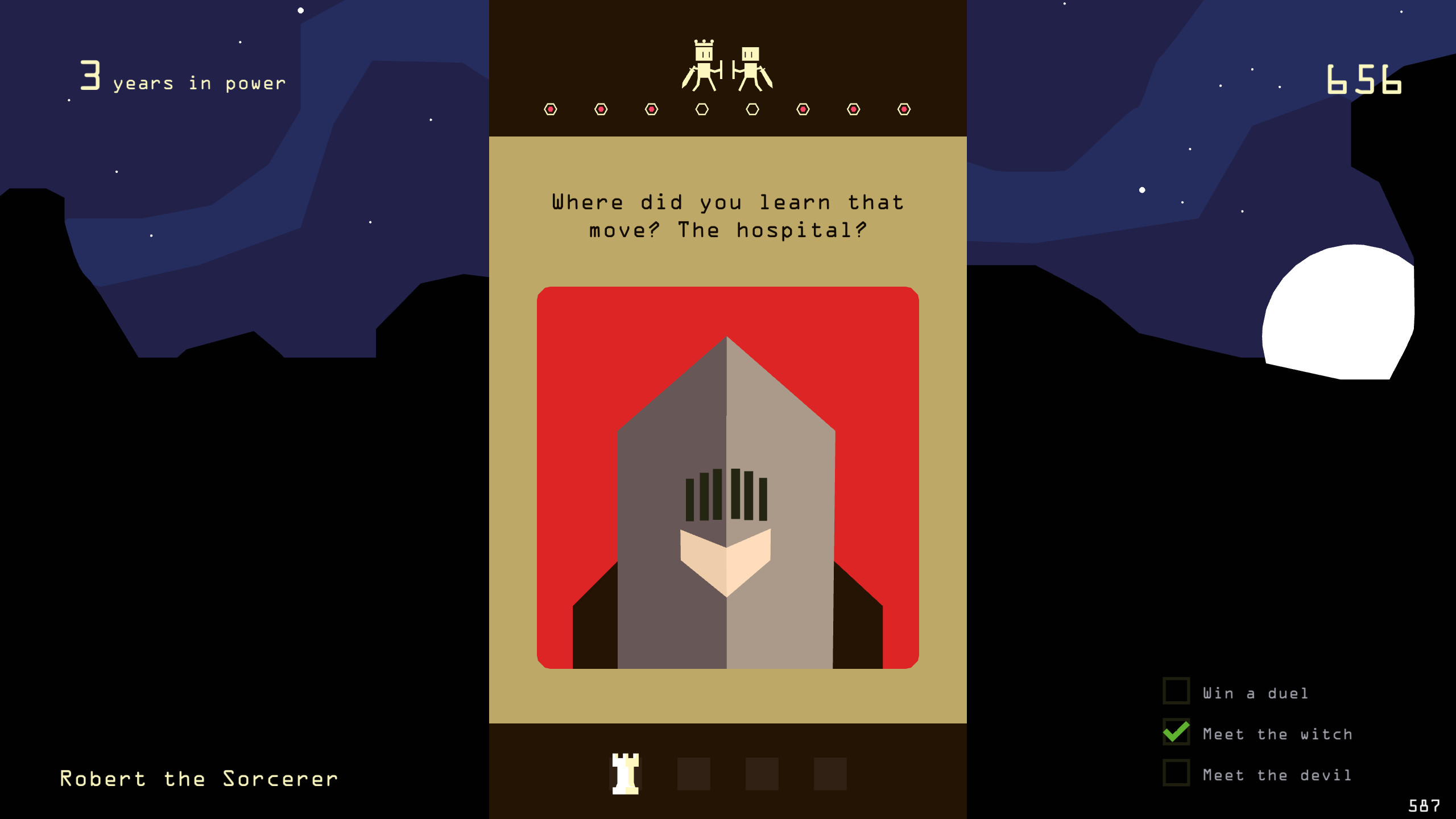
PC Gamer: When you had the idea for Reigns, did you know it was going to be something special?
François Alliot: When we had the first 50 cards we started to see something. The real signal for me was when I got an answer from Devolver because that was the publisher I wanted to work with, so I was pretty surprised when they answered to say, "Yeah, we want to try that." That was good because it meant the pitch worked. And The pitch was like two lines in an email that I sent to Fork. [Fork Parker is the fictitious CFO of Devolver you can follow on Twitter.]
The fact you have binary decisions makes it very easy to have some sort of crowdfunded decision-making. Last year in Barcelona some people projected the game in a game design course, a hundred people in the room decided on the outcome of the reigns.
François Alliot
After that we had a lot of playtests that confirmed people were laughing when they played the game. I have a rule of thumb, when someone comes back to play the game in an event generally that's a good sign. They come, they play 10 minutes, then they go somewhere else, and three hours after they come back and restart playing your game. That's a good sign. It means actually they want something from it, they're not just nice—they really want to play it.
What do you think draws people back to Reigns? What was it that got its hooks into players?
I think it's the gap between the way you play, the basic game mechanics, which is basically to swipe left and right, and the impact of your decisions. In this fictional kingdom the fact that you swipe left or right has very big impacts on your kingdom. You send people to their deaths or prevent invasions. I think that gap is something that is very funny, a basic loop that works very well. Basically we built the whole game around that loop to make sure that whatever the player was doing he would be able to swipe again and carry on.
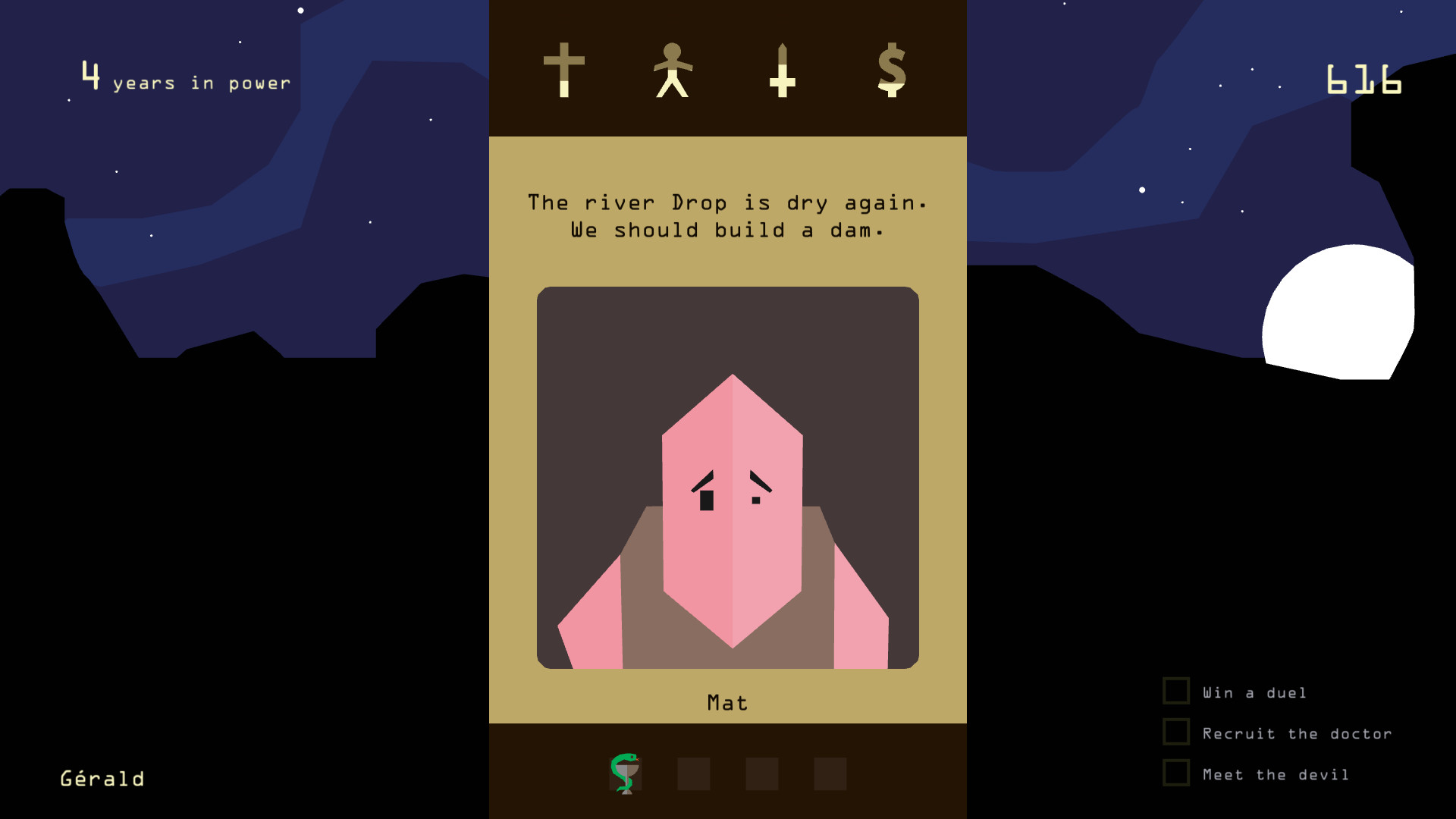
How much effort went into getting the feel of the swiping right? Was that something that worked right away or did you have to iterate a lot?
We did iterate on that a lot, yes. The first prototype you didn't have cards actually, you had portraits. It didn't feel right because it wasn't physical enough, so it didn't feel right. The fact that you are playing with cards creates a connection for people. They are used to swiping cards to move them around, to distribute cards and stuff like that. As soon as you put the character inside a card it was natural for people to move that card. That was a big change that occurred in the second month I think, that removes any need to have a tutorial. It's natural to try to move the card. And after that we spent a lot of time on the way the card moves and reacts to your thumb.
Was it difficult on PC to get something that felt good using a mouse instead of a finger?
Yeah. The mouse was relatively simple, although Reigns worked very well on Steam and had a lot of players on Steam. Of course it's not primarily a PC game, it's primarily a mobile game, but at the same time it feels very good to play the game on a computer, especially with a controller actually. With a mouse it's nice, you go left or right then you click, it's easy, but with a controller it's even better. You can almost feel the swipe, you move the left controller and then you press A to validate. The throw is very good actually.
One of the interesting things that happened with the PC version is some people started to play with other people around and it's not easy to do that on a phone. It's easier to do that on a PC like on Twitch or on YouTube, you play the game and you ask your audience to decide. The fact you have binary decisions makes it very easy to have some sort of crowdfunded decision-making. Last year in Barcelona some people projected the game in a game design course, a hundred people in the room decided on the outcome of the reigns.
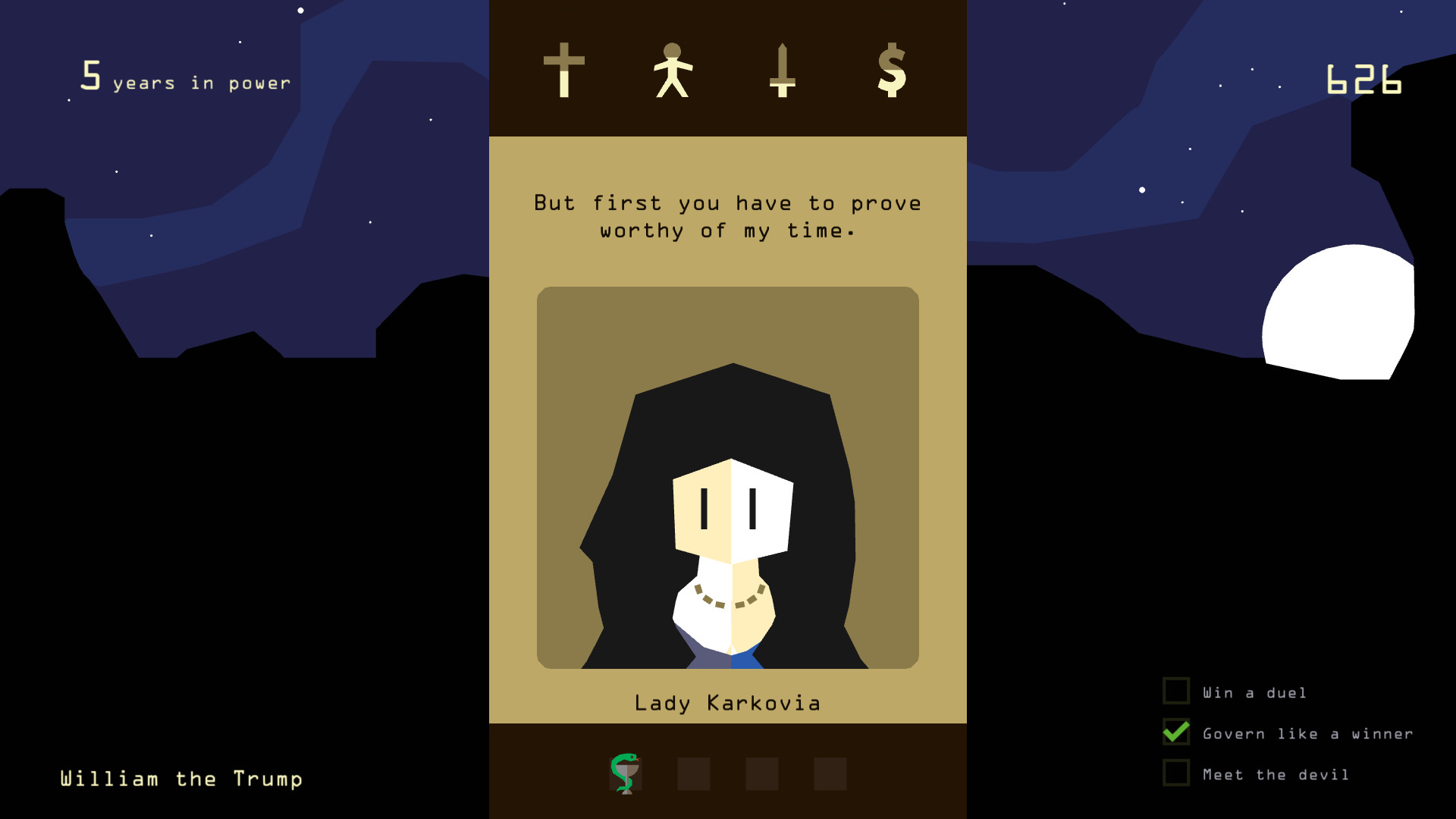
People found a way to turn Reigns into a democracy.
Yeah, in some way. It's very interesting.
When you released it did you know it was a hit straight away? How long did it take to catch on?
We knew straight away that the game worked well. I think the first week was actually very, very good. We had a bit of luck on that, we released the game the same day as No Man's Sky in 2016, no one else did that. Especially on Steam we were basically the only other game that went on the radar of YouTubers and stuff like that, so we were picked by a lot of YouTubers because, if you remember, there was a lot of technical issues at launch [with] No Man's Sky.
That's how you play the game: you have to find a way to trick the Devil.
François Alliot
Can you tell me how many copies you've sold across the different platforms?
1.8 million right now. That's in a bit more than a year.
What's the breakdown like between mobile and PC?
It's 50% iOS, 30% Android, so Google, and 20% Steam. We were really surprised by Google because it's not supposed to be that great for premium games but it worked very well for us. And very surprised by Steam because I think we sold more than 400,000 copies now. That's a lot for a small game especially.
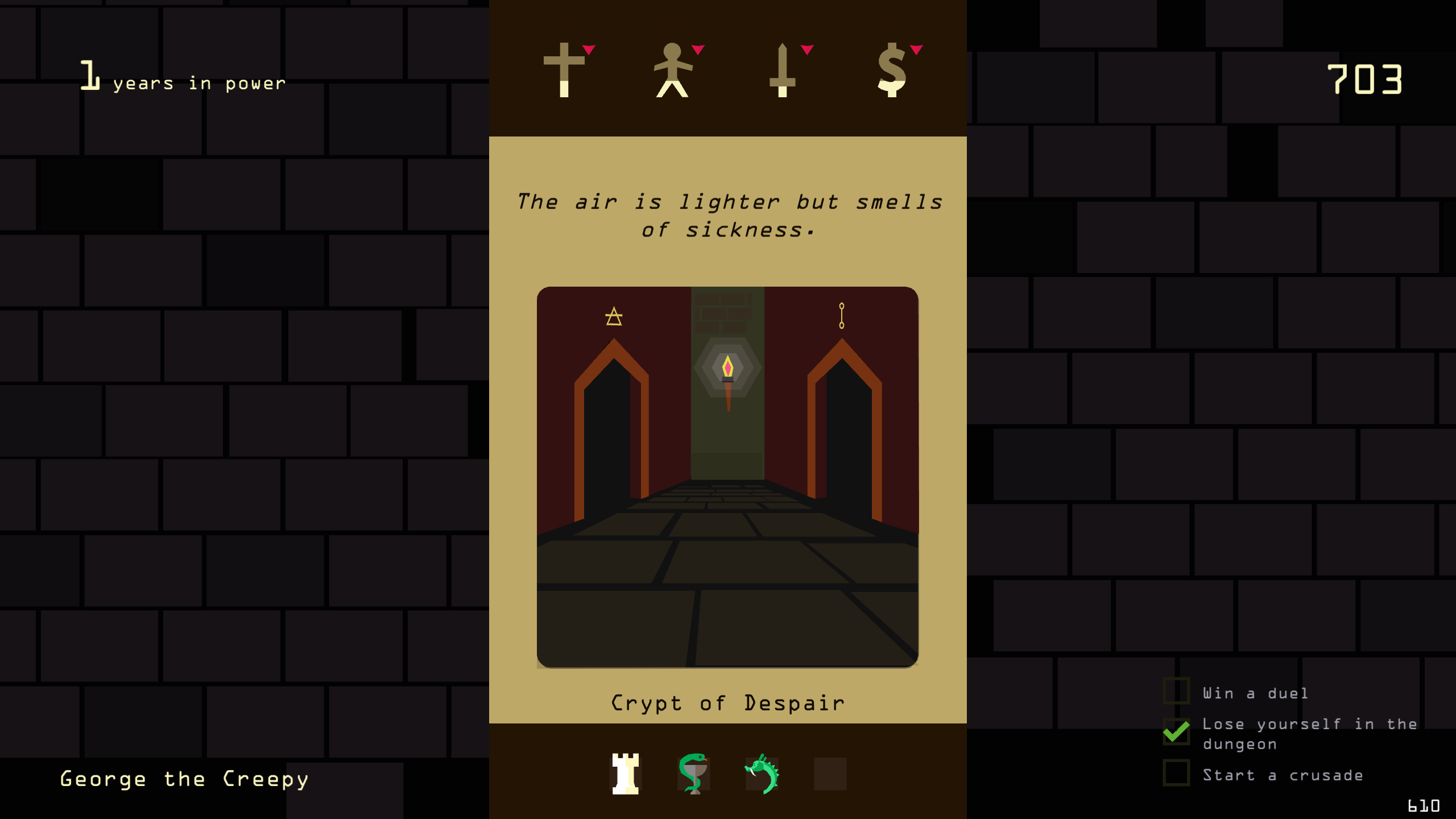
One other thing I wanted to ask about Reigns itself is about the hidden complexity of it. There are things I didn't realize at first, like the blinking of the characters being significant.
These are very small systems but the kind of things I like to put in the game without too much explanation. If someone notices that's good, if not too bad. In Reigns the characters for example they blink, you will notice that, and if you keep answering "no" or being negative towards them they will blink faster. The negative consequences of the decisions they bring to you will be more important.
It's like you're seeing how stressed they are.
Exactly. Their stress and the bad things that can happen because of the decisions you make are enhanced because of that.
Something else I didn't expect to become so pronounced the more I played was the secrets of your dynasty and the introduction of the Devil. It seems like such a simple game but you've hidden a lot in it.
The Devil idea came relatively late in the development. I needed something to bring the game together, first to explain why you're playing these kings and they seem to remember everything that happens, and the advisors tend to repeat themselves also a bit. I needed to explain that and the Devil was a good explanation for that. You're stuck in this malediction and you have to escape, and to escape the Devil you have to trick him. That's how you play the game: you have to find a way to trick the Devil. That's the sort of thing I really like in games. Something that looks very simple actually brings an awful lot of complexity and variations. That's when games can be very, very interesting medium. I'm happy some people actually found the solutions.

Moving on to Reigns: Her Majesty, what did you learn from Reigns that you took over to the sequel?
I kept some ideas but I evolved some others, things that didn't really work in Reigns. Like for example in Reigns we have a big issue of you have to wait a very long time to get some very important card that you will be able to play to access the hidden parts of the game. That's why in Her Majesty you get the inventory so you can play items on the cards. I won't spoil too much but there's a certain set of items and they will become a relatively important part of the game and they're very interesting because they create shortcuts in the narrative. If you play one item on a character it will help you discover all the content a bit more easily.
What's the biggest change about Her Majesty?
I think the biggest change is that the game is more complete, a more mature version of Reigns that goes a bit deeper. We've got more cards, like you won't have this effect where the cards repeat themselves—we've got more than 1,200 cards which is like 30 percent more than Reigns. You won't have the same sense of repetition that you could have in Reigns. And after that we changed a bit of everything.
I'm excited to see what the players will think about this new story, and how we also change the link between the main characters of the Queen in Her Majesty and the four values at the top of the screen. It's a different link to power and the idea that you have a different relation to the four values. That will be interesting, I think.
Reigns: Her Majesty will be out on December 7.

Jody's first computer was a Commodore 64, so he remembers having to use a code wheel to play Pool of Radiance. A former music journalist who interviewed everyone from Giorgio Moroder to Trent Reznor, Jody also co-hosted Australia's first radio show about videogames, Zed Games. He's written for Rock Paper Shotgun, The Big Issue, GamesRadar, Zam, Glixel, Five Out of Ten Magazine, and Playboy.com, whose cheques with the bunny logo made for fun conversations at the bank. Jody's first article for PC Gamer was about the audio of Alien Isolation, published in 2015, and since then he's written about why Silent Hill belongs on PC, why Recettear: An Item Shop's Tale is the best fantasy shopkeeper tycoon game, and how weird Lost Ark can get. Jody edited PC Gamer Indie from 2017 to 2018, and he eventually lived up to his promise to play every Warhammer videogame.

